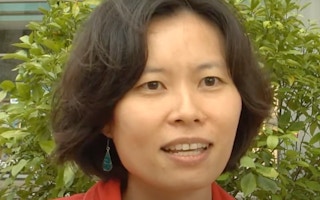Dr Panuwan Chantawannakul, an expert in honey bees at Chiang Mai University in Thailand passed away on Friday after a battle with lung cancer.
To continue reading, subscribe to Eco‑Business.
There's something for everyone. We offer a range of subscription plans.
- Access our stories and receive our Insights Weekly newsletter with the free EB Member plan.
- Unlock unlimited access to our content and archive with EB Circle.
- Publish your content with EB Premium.
Chantawannakul’s death has been linked to chronic exposure to air pollution in Northern Thailand, where she worked for the past decade, according to local press reports.
She was 47 when she died.
Chiang Mai experiences seasonally poor air quality from February to April every year, mainly due to crop burning in the agricultural north of the country. Burning vegetation emits small pollutive particles into the air. When inhaled, these particles, known as PM2.5, can cause serious respiratory problems, including bronchitis, asthma attacks and premature death.
The city was rated as the world’s third most polluted city in March last year because of huge blazes that firefighters attributed to foragers and farmers burning crops.
After her diagnosis with stage 3 lung cancer, Chantawannakul had been an avid supporter of clean air legislation in Thailand. Environmental campaigners have long been pushing for a Clean Air Act that will hold polluters to account and recognise the right of Thais to breathe clean air.
“Dr Panuwan was not a smoker nor was she exposed to smokers. Her only exposure risk was from living in Chiang Mai for over a decade,” civic society group Thailand Clean Air Network said in a post on LinkedIn on Monday.
“Dr Panuwan had so bravely and generously shared her health situation publicly when she was diagnosed with stage 3 lung cancer. She had a kind spirit and wanted her case to help others push for the passage of the Thai Clean Air Act,” the group said.
Air pollution shortens the average Thai’s life expectancy by 1.8 years relative to what it would be if the country met the World Health Organisation’s air quality guidelines. In the Northern region, air pollution levels are 18 to 52 per cent higher than the national average.
Chantawannakul was one of the world’s leading authorities on bees. Among her more recent papers studied the decline in diversity of wild and managed honey bee populations. Honey bees are among the world’s most important organisms, because of their key role as pollinators.
JR Visitkitjakarn, a friend of Chantawannakul’s and founder of Bangkok-based startup Apptividia, commented: “Panuwan always thought of other people first. She cared about environment and the well-being of Thais.”














